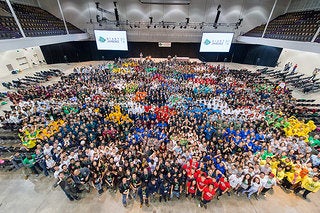The University's iGEM team won the best model award at the International Genetically Engineered Machine (iGEM) Giant Jamboree competition for its synthetic bacterium that has the potential to prevent the spread of infections in hospitals.
Waterloo's team, comprised of 40 engineering, science and mathematics

iGEM combines creative interdisciplinary research with cutting edge science, challenging students to create their own biological systems to help tackle real world problems.
Waterloo's iGEM team members spent eight months developing a synthetic bacterium called staphylocide. Staphylocide turns off the antibiotic resistance gene in MRSA, a bacterium responsible for many serious infections in hospital patients.
Work and experimentation on the synthetic bacterium started in Waterloo's synthetic biology course, Biol349. The course is co-taught by professors Marc Aucoin of chemical engineering, Trevor Charles of biology and Brian Ingalls of applied mathematics.
An incredible opportunity
“The iGEM competition is an incredible opportunity for students to design new solutions to real world problems – who would have thought that our students would want to tackle the issue of drug resistant Staphylococcus infections?" says Aucoin. "All that our students need is the opportunity to be the best that they can be."
Aucoin says he's humbled by the idea that the University can help create opportunities for its undergraduate students. "I couldn’t be more proud,”
Tessa Alexanian, a member of the winning team, says her engineering education has trained her to apply science, not just absorb information about it.
"Working with the iGEM team really emphasized the value of this mindset for me," points out Alexanian, a fourth-year systems design engineering student. "At the jamboree, I felt like the student teams were the ones leading the field, pushing biology towards a standardized, quantified place where we can start to do real engineering."